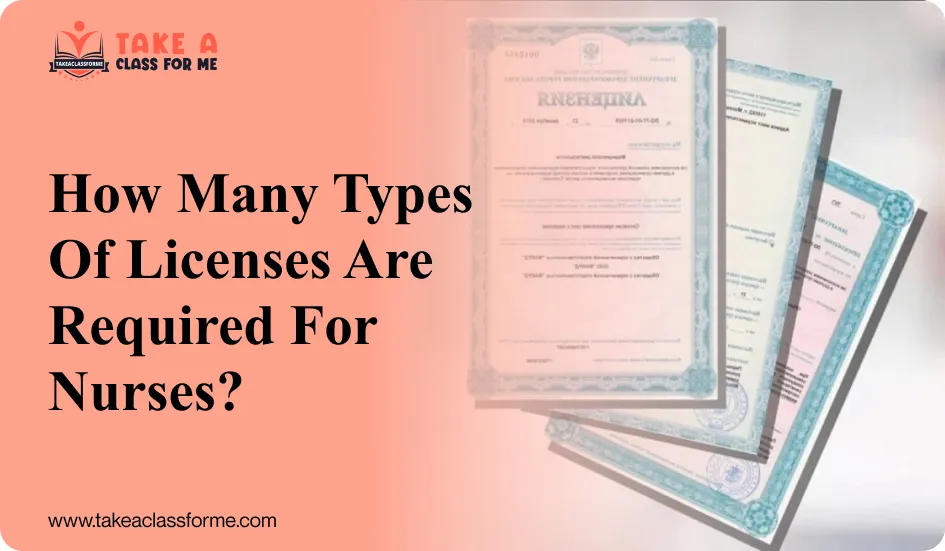
Health care is a sensitive area that comes with a compulsory requirement of verifying the abilities of workers through licensing, and ensuring safe practices are being performed. Aspiring nurses and current professionals might question, how many types of licenses are required for nurses. This article will provide you with all the relevant information needed.
Overview of Nursing Licenses
Through licensing, nurses can substantiate their capabilities adapted through years of education. Licenses brighten up your chances of flourishing in your field as a competent professional who is credible enough to offer patient care without potential risks.
Depending on your experience, location, and academic background there are several types of nursing licenses, let’s have a look at them!
What Are the Different Types of Nursing Licenses?
Licensed Practical Nurse (LPN) / Licensed Vocational Nurse (LVN) License
Licensed Practical Nurses (also called Licensed Vocational Nurses in some states) are nursing professionals who perform minor daily tasks for the patient. They work under Registered Nurses (RN) or Doctors. From hospitals, and nursing care to providing private facilities, their duties evolve around:
- Monitoring blood pressure
- Taking samples
- Fixing bandages
- Assisting patients with dressing
- Performing catheterization process
Education Required
The first step in obtaining your practical nurse licensure by state is to complete a licensed practical nurse program for 1 year.
In these programs, you will gain the necessary expertise in subjects including anatomy, nursing, pharmacology, and biology along with relevant clinical practice. Classes are conducted in hospital settings or community colleges.
But you are not done yet!
The next step in your nursing license requirements is clearing the NCLEX-PN exam. After registering for the NCLEX-PN exam, you need to prepare for the following subjects that will assess you in the form of a computer adaptive test:
- Reduction of risk potential
- Safety and Infection Control
- Coordinated care
- Pharmacological therapies
- Physiological Adaption
- Health Promotion and Maintainance
- Psychosocial integrity
- Basic care and comfort
Registered Nurse (RN) License
A Registered Nurse is someone who has fulfilled the nursing license requirements and is allowed to practice in the health care settings.
Registered nurses monitor and treat patients with their extensive knowledge, they communicate with patients, provide them with medications, and keep them under observation for any adverse reactions.
Educational pathways
To become a registered Nurse, you can pursue any of the two educational pathways:
Associate degree in Nursing
- Associate degree program offers you relevant expertise regarding nursing in a short time as compared to degrees.
- You can start to apply for an RN license right after two years of completion in an associate degree program.
- An associate degree is a quick and inexpensive way to get hands-on Advanced practice nursing licenses.
- Associate degree programs also provide you with training that master your skills for the RN program.
Bachelor of Science in Nursing (BSN)
Comparatively, a BSN degree demands four years, along with in-depth knowledge regarding nursing practices.
With their expanded curriculum, more course hours, and a deeper comprehension of nursing practices along with the ability to handle patients in emergencies, BSN students are considered more during jobs.
Many associate degree individuals are now considering RN TO BSN programs, to complete their bachelor’s degree which will help them to stay competitive in the field.
Where BSN consists of lengthy courses to provide you with a detailed comprehensive guide for nursing, passing exams and reaching your goal may feel impossible at times.
But you don’t need to worry, you can avail options like pay someone to take my online nursing exam to achieve your dream career!
NCLEX-RN Exam
Attempting the licensing exam, such as the National Council Licensure Examination, after your graduation, ensures that as a beginner, you are proficient enough to start working on patients.
This is a computer adaptive test, ranging from 75 to 145 questions, and in case you fail, you are allowed to retake it after 45 days.
Job roles for RN include:
- Looking after the patient: Performing tasks such as taking samples, monitoring vitals, and preparing patients for surgeries.
- Talking to the patient’s family: Communicating about the conditions and offering them moral support.
- Supervising: Registered nurses supervise junior nurses and LPNs.
- Collaboration: To ensure that health care is managed smoothly, registered nurses collaborate and communicate with physicians, assistants, and other health care workers.
Licensed Practical Nurse (LPN) vs. Registered Nurse (RN): What’s the Difference?
Whereas both Licensed Practical Nurses and Registered Nurses play a vital role in hospitals, they differ in certain aspects including academic background and job roles.
- Education: To become a LPN you must take an education program that lasts for 1 year whereas becoming an RN requires you to either complete a 2-year associate degree or 4-year bachelor’s degree.
- Licenses: Advanced practice nursing licenses such as NCLEX-RN must be cleared by the RN, whereas LPN attempts the NCLEX-PN exam.
- Scope of practice: An LPN is limited to basic medical practices such as wound management and monitoring whereas an RN can perform more advanced procedures such as administrating medications through IV.
- Supervision: An RN supervises the LPN, and works independently, whereas the LPN is supposed to work under an RN.
Advanced Practice Nursing Licenses: NP, CNS, CRNA, and CNM Explained
Wondering what’s next after becoming an RN? The hustle doesn’t end here. Opportunities from master’s and doctorate programs will welcome you next.
Let’s explore the RN license types:
An advanced Practice Registered Nurse is a highly trained nurse, who has completed a Masters degree in nursing or Doctor of nursing practice program. (DNP) At this point, nurses are eligible to treat and medicate patients as a physician does.
An APN specializes in one of the following four roles:
Nurse Practioner
Nurse practitioners provide extensive patient care from diagnosing patients to treating them. In some states, they are required to collaborate with a physician, in some conditions they perform treatment individually.
Certifications
Nurse practitioners can get certified and specialize in fields such as:
- Gerontology
- Pediatrics
- Family Practice
- Mental health
Clinical Nurse Specialist
Clinical Nurse Specialists also get certified in one specialty but what sets them apart from nurse practitioners is instead of providing treatments, they focus more on the research side, educating nurses and bringing change in the healthcare industry.
From pediatrics to adult health, Clinical nurse specialists can specialize in any of the areas of their interest.
Certified Nurse Midwife
Certified Nurse Midwives provide extensive care to mothers during childbirth and offer them moral support. They are mostly in the gynecology and obstetrics department where their main focus is to educate mothers and maintain their health.
Anesthetist Nurse
Certified Anesthetist Nurses are present during surgeries to administer anesthesia and also provide aftercare while monitoring patients after surgery. They are present across hospitals in surgery units.
To fulfill all four of these nursing certification requirements you are supposed to complete a bachelor in sciences for a nursing degree, become a registered nurse, and then apply for a master’s or doctorate program (that makes you eligible for Advanced practice nursing licenses), and gain specialties from any one of these advanced certifications.
Specialty Certifications
Instead of obtaining licenses, nurses also opt for certain certifications that increase their career opportunities, these include :
- Oncology Nursing Certification: These nurses provide support and care to cancer patients.
- Pediatric Nursing Certification: These nurses look after children, and ensure that they being the most vulnerable ones are taken care of.
- Critical Care Nurse: A critical care nurse monitors patients in the intensive care units.
Understanding Nurse Licensure by State: What You Need to Know
Every state has different nursing license requirements to ensure clinically secure and risk-free practices are being carried out. A board of nursing issues safe guidelines and regulations as per the policies of every state.
Requirements of these states differ from basic education and experience to more strict options such as expert English skills, a well-disciplined character, and stable mental and physical health.
Nurses should always keep a check of their state’s licensing requirements and the ones wishing to transfer can connect with the board of nursing to seek their approval of getting the nurse licensure by state.
They might require you to verify your education through academic documents.
Nurse licensure by state may differ in the:
- License Time frame
- Documents require
- Cost
- Renewal Requirements include completing a course and getting a degree, or experience.
- Renewal dates
The Nursing Licensure Compact (NLC): Practice Across State Lines
A nursing licensure compact is an agreement between different states that allows nurses to practice their license throughout multistates including their residence state as well as states they are willing to travel to.
Residence state is referred to as the state in which the nurse votes and has obtained a driving license.
The benefits of the nursing licensure compact include:
- No additional need to obtain a license from another state.
- Increased career opportunities throughout multiple states whenever you are traveling.
- Convenient traveling and medical practice during endemics, and emergencies.
- Mastered skills of nurses with exposure to a different healthcare environment.
How to Apply for a Nursing License: Step-by-Step Guide
Nursing offers you a wide range of career opportunities and there are many roads for you to take! Let’s take a look at the step-by-step guide to the Nursing license requirements.
Education
Starting from education, you need to gain relevant knowledge from accredited nursing programs and complete a bachelor’s degree or an associate degree.
Authorization for test
To attempt the NCLEX-RN, You need to apply for authorization for the test through your board of nursing and provide them with your relevant documents which will grant you access to appear for the NCLEX-RN.
Get Registered
Get yourself registered for the NCLEX-RN exam.
Prepare for the NCLEX-RN Exam
This is a crucial exam, testing you for your professional knowledge regarding all the hard work that you have performed during your study years, so make sure to ace it!
Here are some tips to make the best out of it:
- Look for study guides regarding the exam.
- Attempt practice quizzes to check your preparation.
- Manage time, and monitor your test duration.
Attempt the NCLEX- Exam
Attempt the exam with a positive mindset and guarantee yourself that you are going to clear it!
Get your results
If you pass, congratulations! You are a Registered Nurse now. If you fail, it’s okay as you can reattempt after 45 days.
Get Licensed
Obtain your licensing by showing your NCLEX exam results.
Start Practicing
You are now legally allowed to interact with patients as a Registered Nurse.
Nursing License Renewal: Keeping Your Credentials Current
Getting licensed as a nurse is not where you should stay limited, with advanced policies and regulations you will be required to renew your license. However, these renewals will require you to show an updated experience or education completed to prove your ongoing practice.
Nurse licensing renewal is a process that grants more time to nurses to continue their practices for another several years. These renewals serve as an authentication that nurses are well-updated regarding the new healthcare methodologies.
Certifications and education also ensure that nurses know the latest amendments in their specialization and adhere to them.
As a nurse, you can continue your education by taking online courses, and training, and getting yourself enrolled in accredited colleges.
Top Challenges in Getting Your Nursing License and How to Overcome Them
Becoming a nurse because of the profession’s immense respect sounds great but the process is not easy at all. You need to pass rigorous testing procedures and follow the state policies while constantly meeting your educational requirements and experiences.
Nursing comes with its challenges that might act as hurdles for you. Let’s see what these problems are and how can we navigate these challenges:
The NCLEX-Exam
From the 100 above questions to the unique computer adaptive testing method, the NCLEX-Exam is no easy task. Even if you are happily answering questions correctly, you will be loaded with more difficult ones!
Solution
- Keep your concepts cleared from nursing school
- NCLEX preparation courses contain wide study material.
- Create a study schedule
- Attempt practice tests to speed up your timing.
Educational requirements
Balancing work life with completing the educational requirements is another challenge.
Solution
- Consider programs that match your lifestyle.
- Use time management apps and avoid overtime duties.
State-specific licensing requirement
Understanding different criteria for licensing from multiple states can be confusing especially when they demand from you extensive educational requirements or work experience. This can be overwhelming and might restrict you from expanding your services to another state.
Solution
- Do your research regarding the requirements of your state.
- Stay updated on your state’s participation in the Nursing Licensure Compact (NLC)
- Keep in touch with your professors, they can make this process streamlined for you with their guidance.
Background checks: Many states may require nurses to undergo a criminal history check, leading to the cancellation of a license if you are involved in such scenarios.
Conclusion
The nursing profession has different stages, each with its requirements and qualities. Every stage qualifies you with the type of nursing licenses they offer. The more you research regarding state-specific licensure requirements, the more chances of getting your license because you can choose your education according to them.
It’s crucial to know every aspect of nursing when you start a nursing school to make your career setting phase easier.
From identifying the difference in scope between LPN vs. RN licenses to exploring the vast opportunities of treating patients offered through Advanced practice nursing licenses, nursing is a career that is continuously moving towards progression and for you to gain and maintain these licenses, it is mandatory to increase your work hours and continue education.
As an aspiring nurse, the information about licenses may have left you feeling overwhelmed. But it’s better to focus on your future and leave your current academic responsibilities on options like Take A Class For Me.
Expert Assignment Writer
Hi everyone! Hello there, My name is Emily, and I provide Online Class Helper services in Los Angeles. Who says balancing between work or school by meeting and final tasks, and having a busy social life? I discovered “Take A Class For Me” when I couldn’t effectively manage the rigors of an online business management class. They were so helpful with our online class whether it be with tutorials or assignment submissions. I can now devote time and energy to a job, but I do not have to sacrifice academic performance for it.






